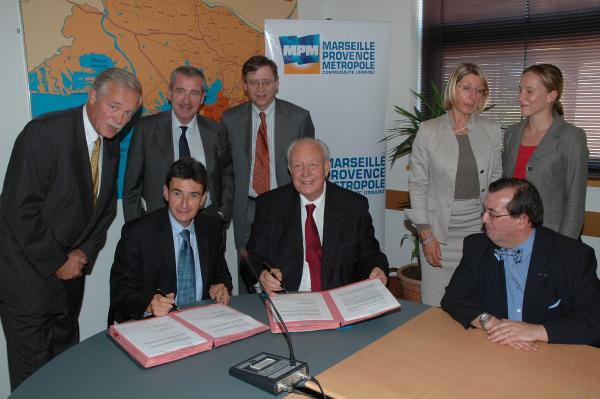
The European Investment Bank (EIB), the EU's financing institution, is granting a EUR 150 million loan for the construction of the new Marseille tramway (Provence-Alpes-Côte d'Azur region in southern France).
Jean-Claude Gaudin, President of the Communauté Urbaine Marseille Provence Métropole and Mayor of Marseille, and EIB Vice-President Philippe de Fontaine Vive signed the memorandum of understanding for the EUR 150 million loan on 29 September 2006 in Marseille.
The EIB loan will be used for the first phase of the tramway works, which concern mainly the construction of two lines:
- Line 1, Noailles - La Blancarde - Les Caillols (consisting of the rehabilitation of an abandoned line and a tunnel in Noailles);
- Line 2, Euroméditerranée-Gantès - La Blancarde.
The project includes 11.9 km of lines, 27 stations, the construction of a new depot, the acquisition of 26 tram-sets and works on the roads adjacent to the tramway. 70% of the tramway will be put into service by mid-2007.
The new lines will serve the centre of Marseille towards the North and the West and will complement the metro and bus networks to offer passengers a fully integrated urban transport service.
This programme forms part of the Urban Transport Plan of Marseille Provence Métropole and aims primarily at boosting the use of public transport with a view to reducing the impact of cars in the city and improving the environment and the quality of life in urban areas.
This plan, which is in line with European Union policies, is eligible for financing by the European Investment Bank. Sustainable urban development is a priority focus of the EIB's operations to which is has devoted EUR 28 billion of financing throughout the European Union over the past five years, including EUR 15 billion for urban transport. It has thus been involved in public transport projects in a number of major European cities and capitals (see background note).
Moreover, since the financial commitments in this sector are very onerous, it is important, as Philippe de Fontaine Vive emphasised at the signing in Marseille, that the European Union's financing arm supports the infrastructure projects of local authorities for the benefit of citizens and it is essential that this partnership is enduring. He welcomed this first operation in support of the Communauté Urbaine Marseille Provence Métropole.
The EIB has already advanced loans totalling EUR 1.5 billion in the Provence-Alpes-Côte d'Azur region, mainly for investment in the transport and energy sectors, but also for environmental management (water treatment) schemes and industrial projects.
The EIB sees its lending in favour of exclusive lane public transport as part of its priority action to promote sustainable urban development, with the emphasis on reducing pollution and improving the quality of life while at the same time encouraging economic expansion in towns. In France, it has provided funding of EUR 3 billion over the decade for numerous urban transport projects, notably in Bordeaux, Clermont Ferrand, Grenoble, Le Mans, Lyon, Montpellier, Mulhouse, Nancy, Nantes, Orléans, Rennes, Strasbourg, Toulouse and Valenciennes.
Throughout the European Union, it has contributed to the development of urban transport with loans running to some EUR 15 billion since 2000. It has been involved in financing metros and tramways in various cities, including Athens, Alicante, Barcelona, Berlin, Brussels, Budapest, Dublin, Düsseldorf, Lisbon, London, Madrid, Manchester, Munich, Porto, Prague, Rome, Stockholm and Valencia.
The EIB considers that all these projects contribute to the objective of improved management and enhancement of the environment. As a European institution committed to furthering the policies of the EU, it has allocated to this priority objective one third of its loans within the EU-25, totalling almost EUR 50 billion over the past five years.

Photographer: EIB ©To be defined
Download original